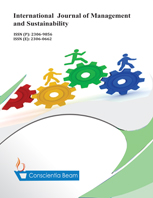Modern Organization Theory: Analyzing the Complexity of Coordination and Cooperation in the Modern Organizations
DOI:
https://doi.org/10.18488/journal.11/2014.3.5/11.5.261.268Abstract
The theory consists of principles that describe relationships observed in association with phenomenon. The primary role of theory is to provide a description as well as explanation of the phenomenon. This means that organization theory can help us in understanding us; what is organizations, how organization behaves in a given environment and how they may behave in a different set of circumstances. The organization theory has been developed as a result of systematic study of organizations. Therefore, it has general applications to all type of organizations. It provides way of thinking about organization and managing the organizations. Organization theory deals primarily with the organization level phenomenon such as organizational change and growth, planning and design, development, politics, culture and structure. In the context of organization level phenomenon, this research study deals with effectiveness of the organization. The study is aimed to investigate the complexity of coordination and cooperation in the context of modern organization. The research has studies two major Model of organization theories; System Model and Contingency Model and has critically deliberated on the complexities of coordination and cooperation in the context of modern organizations, Finally, in the light of study of these modern organization models, the author has suggested Henry Mintzburg’s Model for dealing with the complexity of coordination and cooperation.

